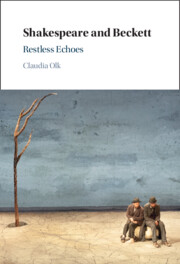Book contents
- Shakespeare and Beckett
- Shakespeare and Beckett
- Copyright page
- Contents
- Acknowledgements
- Abbreviations
- Introduction
- Chapter 1 Shakespeare and Beckett on the Edges
- Chapter 2 Molecular Shakespeare – Beckett Reading Shakespeare through Joyce
- Chapter 3 ‘Some remains’: Beckettian and Shakespearean Echoes
- Chapter 4 Purgatory and Pause – Shakespeare, Dante and the Lobster
- Chapter 5 ‘[It is] winter/Without journey’ – Still Lifes in Beckett and Shakespeare
- Chapter 6 Endgames
- Chapter 7 Theatres of Sleep
- Conclusion
- Bibliography
- Index
Chapter 6 - Endgames
Published online by Cambridge University Press: 19 January 2023
- Shakespeare and Beckett
- Shakespeare and Beckett
- Copyright page
- Contents
- Acknowledgements
- Abbreviations
- Introduction
- Chapter 1 Shakespeare and Beckett on the Edges
- Chapter 2 Molecular Shakespeare – Beckett Reading Shakespeare through Joyce
- Chapter 3 ‘Some remains’: Beckettian and Shakespearean Echoes
- Chapter 4 Purgatory and Pause – Shakespeare, Dante and the Lobster
- Chapter 5 ‘[It is] winter/Without journey’ – Still Lifes in Beckett and Shakespeare
- Chapter 6 Endgames
- Chapter 7 Theatres of Sleep
- Conclusion
- Bibliography
- Index
Summary
This chapter considers the reciprocal productivity between Beckett’s Endgame and Shakespeare’s romance The Tempest. It examines the settings of the two plays, their dialectics of making and unmaking, their dynamics of confinement and release, the materiality of air and earth, and the notion of ending. It looks at the insular dominions of Prospero’s island and the space inhabited by Beckett’s characters in Endgame, and argues that the imperfections and shortcomings of a medium are not an end in themselves but become the grounds on which plays such as The Tempest and Endgame transcend the finitude of their art and reflect back on it, asserting its very finitude as a condition of possibility.In both plays, the game of chess figures as a structural and thematic component and reflects on the art of the playwright. The chapter analyses the brief scene in which Prospero discovers Ferdinand and Miranda playing chess. The scene functions as a mise-en-abîme, as a play-within-the-play, and becomes a metaphor for the play itself. In the many references to chess in Beckett’s works, above all in Endgame, chess, as this chapter argues, presents a matrix of multiplicity that remains tied to form.
- Type
- Chapter
- Information
- Shakespeare and Beckett , pp. 152 - 180Publisher: Cambridge University PressPrint publication year: 2023

